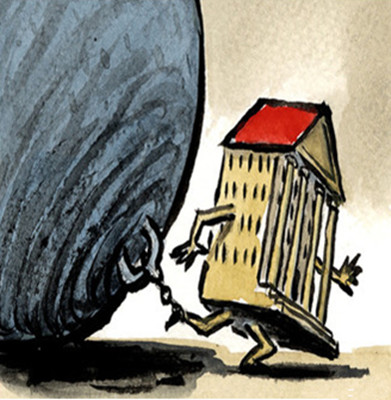銀行監(jiān)管
Capital punishment
死刑
The latest global capital rules to make banks safer are sensible. Much else that regulators are doing is not
為了銀行更加安全而最新設(shè)立的全球資金規(guī)則是合理的。監(jiān)管機構(gòu)做得許多其他事卻并不合理。
GIVEN how many things went wrong at banks during the financial crisis, it is not surprising that regulators have come up with several new rules to set them to rights. On November 10th the Financial Stability Board (FSB), an international body charged with avoiding future crises, unveiled yet another test banks will have to pass—the fifth so far. At the same time Mark Carney, the head of the FSB and governor of the Bank of England, declared that these measures, if taken together and implemented properly, would “substantially complete the job” of “fixing the faultlines” that led to the crash.
考慮到金融危機時期有多少銀行出現(xiàn)問題,監(jiān)管者們提出幾個新的規(guī)則讓銀行歸位也不足為奇。11月10日,金融穩(wěn)定委員會,一個防止未來危機發(fā)生的國際組織,推出了另一項銀行必須通過的測試—迄今為止第五項測試。同時,金融穩(wěn)定委員會會長兼英格蘭銀行總裁馬克·坎尼宣布,這些措施如果同時采取并且合理執(zhí)行將會“基本完成”修復(fù)導(dǎo)致崩潰的錯誤這一職能。

Broadly speaking, he is right. The alphabet soup of rules devised in recent years makes it much harder for banks to be run in the risky manner that was all too common before 2007. New liquidity requirements prevent them from borrowing money on fickle overnight markets while lending it on for 30 years, the practice that felled Northern Rock, the first British bank to fail during the crisis. New rules on capital, including the one unveiled by Mr Carney this week, will force banks to have a decent safety buffer so that tiny changes in the value of their assets do not cast them automatically into the arms of the state.
廣泛意義來講,他是正確的。近年來,逐條修改的規(guī)則使得銀行更難以危險的方式運行,這些方式在2007年以前是非常常見的。新的現(xiàn)金儲備防止銀行向瞬息萬變的隔夜市場借款,再向外貸出為期的30年貸款。 那個做法使得英國首家銀行北巖銀行在危機中倒閉了。現(xiàn)金方面的新規(guī)則包括坎尼本周推出的迫使銀行擁有可靠的安全緩沖,這樣其資產(chǎn)的微小變化將不會自動使他們處于備戰(zhàn)狀態(tài)。
Better yet, the latest measure ensures that if a bank's shareholders are wiped out there will in future be an additional tier of investors standing between failure and a taxpayer-funded bail-out. “Total loss-absorbing capacity”, in the regulatory argot, will soon include not just the money invested by shareholders, but also that lent by bondholders, most of whom avoided any losses during the crisis thanks to government bail-outs. It is the centrepiece of the FSB's efforts to make sure that no bank is “too big to fail” (see article).
更好的是,最新的措施確保如果銀行的股東在那兒倒下,從今以后會成為站在失敗和納稅人資助的緊急財政援助之間的投資者的一個額外聯(lián)系。“總的吸收損失能力”,監(jiān)管體系的行話,不就將不僅僅包括股東投資的錢,還將包括債券持有人借出的部分,多虧了政府的緊急財政援助,大多數(shù)在危機時避免了損失。這是金融穩(wěn)定委會努力確保沒有銀行“大而不倒”的重點。(另見文章)
This extra capital is all-important. Before 2007, some banks had such a thin loss-absorbing cushion that a 2% fall in the value of their assets put them out of business. Imposing losses on their creditors involved long and uncertain lawsuits, and so was seldom attempted during moments of crisis. Instead, to stop the panic spreading, governments resorted to bail-outs. Under the new dispensation, however, “systemically important” banks should be able to endure a 20% fall in the value of their assets before placing panicky calls to the central bank.
這筆額外的資金是非常重要的。2007年以前,一些銀行只有極小的吸收虧損的緩沖,這樣他們資產(chǎn)只要下降2%,他們就要歇業(yè)了。將損失強加在債權(quán)人身上涉及冗長而又不確定的訴訟,所以在危機時候很少實施。相反,為了阻止恐慌擴散,政府采取緊急援助。但是在新的法律下,“系統(tǒng)性重要”銀行在向中央銀行發(fā)出恐慌警報前,應(yīng)該可以承受20%的資產(chǎn)減少。
The need to hold more capital makes banks less profitable—but that is no bad thing: the mammoth profits they made in the boom years were predicated on the subsidy they were receiving in the form of implicit government backing. It may also make them shrink, since one way to raise capital relative to assets is to hold fewer assets. That, too, is for the best, as long as people and businesses can find other ways to borrow. Relying more on stock- and bond-issuance would enable the economy to be financed at much less risk to the taxpayer.
需要持有更多的資本使得銀行獲益更難——但那不是件壞事:他們在蓬勃年代獲得的巨大收益基于他們以秘密的政府支持形式所收到的津貼。它也會導(dǎo)致他們縮水,因為一個增加資產(chǎn)資本的方法是持有更少的資產(chǎn)。那也是好的,只要人們和公司能夠找到其他方式借錢。更多地依賴股票和債券會使經(jīng)濟對納稅人來講風(fēng)險更小。
If they want to stay in business, banks will also have to ask shareholders and the bond markets for more money. Attracting the capital that will make banking safer will be hard, with profit forecasts so anaemic. However it will also be made unnecessarily difficult by capricious behaviour from the very watchdogs who are ordering banks to raise the funds.
如果他們想要繼續(xù)做生意,銀行還要問股東和債券市場要更多錢。吸引使得銀行更加安全的資本將會更困難,因為利潤預(yù)見很貧乏。但是,命令銀行增加資金的監(jiān)察機構(gòu)多變的行為也未必會使銀行更困難。
One problem is the endless tinkering with the rules. For all Mr Carney's talk of finishing the job, global regulators have yet to set the minimum level for several of their new capital requirements. National regulators are just as bad. No bank can be certain how much capital it will need in a few years' time. Pension funds and insurance companies rightly fret that even a tiny tweak in any of the new regulatory tests is enough to send a bank's share price plummeting (or, less often, rocketing).
一個問題是無止境的修補規(guī)則。對于坎尼關(guān)于結(jié)束這項工作的講話,全球監(jiān)管機構(gòu)還沒有設(shè)置幾項最低資本需求。國家監(jiān)管機構(gòu)情況也一樣糟糕。沒有銀行能確定幾年后需要多少資本。養(yǎng)老基金和保險公司有理由煩惱,新的管理測試?yán)镆粋€極小的變化就足以使得銀行的股價驟降(或者極少情況下劇增)。
The dark side of banker-bashing
銀行家譴責(zé)的陰暗面
The other problem is the multi-billion-dollar fines levied by regulators in America and Europe, seemingly calibrated not to the scale of the alleged wrongdoing but to banks' ability to pay. This week six big international banks agreed to hand over billions for manipulating foreign-exchange markets, with little explanation of how the penalties were calculated. New edicts unrelated to capital, such as America's assaults on money-laundering and tax-dodging, add yet more obligations.
另一個問題是美國和歐洲監(jiān)管機構(gòu)征收的好幾十億的罰款,似乎不是以據(jù)稱的不法行為為衡量標(biāo)準(zhǔn),而是以銀行支付能力為準(zhǔn)的。本周,6家大型國際銀行同意上交幾十億,理由是操縱外匯市場,沒有解釋懲罰是怎么計算的。新的與資本不相關(guān)的法令,如美國打擊洗錢和逃稅的法令,增加了更多的義務(wù)。
Banks can hardly be surprised that regulators have rewritten the rule-book and then thrown it at them. But, for the health of the system, the rules need to be predictable, transparent and consistent. Incredibly, the regulations emanating from America's Dodd-Frank financial reforms are still being written, more than four years after the law was passed. Europe is scarcely better. Impose demanding capital rules, but stop adding more red tape: that should be the mantra of bank regulators just about everywhere.
銀行毫不懷疑,監(jiān)管機構(gòu)已經(jīng)重寫了規(guī)則,然后扔向他們。但是,為了這個體系的健康,這些規(guī)則必須可預(yù)測、透明并且一致。難以置信的,源自美國多德弗蘭克金融改革的監(jiān)管機構(gòu)還在寫,而該項法案通過已經(jīng)有4年了。歐洲情況也沒有更好。強加的資本規(guī)則,但是不再增加更多的繁文縟節(jié):那是世界各地銀行監(jiān)管者的咒語。譯者:王丹培
譯文屬譯生譯世












